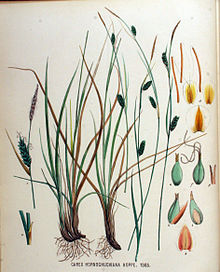Carex hostiana
| Carex hostiana | |
|---|---|

| |
| Botanical illustration | |

| |
| Inflorescence | |
| Scientific classification | |
| Kingdom: | Plantae |
| Clade: | Tracheophytes |
| Clade: | Angiosperms |
| Clade: | Monocots |
| Clade: | Commelinids |
| Order: | Poales |
| Family: | Cyperaceae |
| Genus: | Carex |
| Species: | C. hostiana |
| Binomial name | |
| Carex hostiana | |
| Synonyms[2] | |
List
| |
Carex hostiana, the tawny sedge, is a species of flowering plant in the genus Carex, native to Europe and northeast Canada, and extinct in Massachusetts.[2][3] It is a member of the Carex flava species complex.[4]
Description
The rhizomatous perennial sedge has a tufted habit and can be evergreen or deciduous[3] It has straight culms with a triangular cross section that are 25 to 60 cm (9.8 to 23.6 in) in length. The linear shaped leaves sound on the flowering stems have a length up to 14 cm (5.5 in) and are 1.5 to 4.5 mm (0.059 to 0.177 in) wide. The inflorescences are found at the tip of the culm in the form of 5 to 70 mm (0.20 to 2.76 in) long spikes.[5]
Taxonomy
The species was first formally described by the botanist Augustin Pyramus de Candolle in 1813 as a part of the work Catalogus Plantarum Horti Botanici Monspeliensis. It has three homotypic synonyms; Carex fulva, Trasus fulvus and Trasus hostianus and 13 heterotypic synonyms including; Carex armena, Carex biformis, Carex fulvescens and Carex subsalsa.[2]
Distribution
In Europe the range of the species extends from Spain in the west to Ukraine in the east and from Italy and Greece in the south to as far north as Finland, Norway and sweden. In the Americas it is found in Quebec and Newfoundland in Canada.[2]
See also
References
- ^ Cat. Pl. Horti Monsp.: 88 (1813)
- ^ a b c d "Carex hostiana DC". Plants of the World Online. Board of Trustees of the Royal Botanic Gardens, Kew. 2017. Retrieved 8 January 2021.
- ^ a b "Carex hostiana tawny sedge". The Royal Horticultural Society. Retrieved 8 January 2021.
- ^ Hedrén, Mikael (2004). "Species delimitation and the partitioning of genetic diversity – an example from the Carex flava complex (Cyperaceae)". Biodiversity and Conservation. 13 (2): 293–316. doi:10.1023/B:BIOC.0000006499.20169.f9. S2CID 24261932.
- ^ "Carex hostiana DC". The World Flora Online. World Flora Online. Retrieved 22 August 2022.
